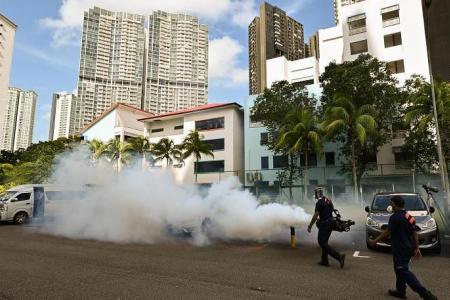270 cases of dengue reported from June 11 to 17; Toa Payoh cluster grows to 139 cases
The number of dengue cases reported in Singapore from June 11 to 17 surged to 270, up by 65 per cent from the 163 cases reported the week before.
The National Environment Agency (NEA) website on Thursday showed that there were 44 active dengue clusters, three of which were flagged as red alerts – high-risk areas with 10 or more cases.
This is up from the 31 active dengue clusters reported a week ago.
A cluster at several Housing Board blocks and the Oleander Towers condominium in Lorong 1 and Lorong 2 Toa Payoh involved 139 cases in total, of which 134 were detected in the past two weeks.
On June 13, the cluster had 19 cases, the NEA website showed.
Another cluster in the Jurong East area has grown to 13 cases, with nine cases recorded in the past two weeks.
The third high-risk cluster, comprising several HDB blocks in Lorong 1A and Lorong 2 Toa Payoh, grew to 10 cases, with eight cases found in the past two weeks.
An active dengue cluster is an area with active transmission, according to the NEA website.
Dengue is spread by Aedes aegypti mosquitoes, which breed in stagnant water.
A total of 3,865 dengue cases in the Republic have been reported in 2023 as at June 17.
In March, NEA warned that a dengue outbreak in Singapore was likely in the warmer months of June, July and August, amid a surge in the Aedes aegypti mosquito population.
These mosquitoes are transmitting the less common dengue virus serotype 3, or DenV-3, that many residents are vulnerable to due to lack of exposure.
Meanwhile, there was one new case of Zika virus reported on Tuesday, bringing the total number of Zika cases this year to 21.
There are no active Zika clusters here. This means the cluster in the Kovan area, which had 15 cases in total, is considered closed.
Similar to dengue, the Zika virus is transmitted by the bite of an infected Aedes mosquito.
Those infected with the Zika virus may experience fever, rash and joint pain within three to 14 days of being bitten. Most patients, however, do not develop any symptoms.
Get The New Paper on your phone with the free TNP app. Download from the Apple App Store or Google Play Store now


